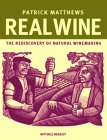
|
Patrick Matthews Hardcover - 288 pages (14 October, 2000) Reviews www.wineanorak.com Patrick Matthews ploughs a different furrow to other wine writers. He's a thinker -- and a bit philosophically inclined. While most wine books aim to simplify the complicated subject of wine for the general reader, Matthews isn't happy to take this well trodden path. Instead, he takes a complex subject and makes it even more complicated. He established his reputation as someone prepared to grapple with the thorny issues surrounding wine in his previous book, The wild bunch: great wines from small producers, and Real wine follows in a similar vein. However, while The wild bunch was an impressive book, Real wine is even better. It's a brilliantly conceived book that makes gripping reading for anyone intrigued by the deeper issues of wine and its production. In essence, this book addresses the question of how to go about making a 'real wine'. This provides a thread of continuity that ties together each of the chapters. These embrace some of the most contentious yet vital issues surrounding wine today, including site selection, planting the vines, organic and biodynamic viticulture, choice of grape variety, wine making techniques, what constitutes a wine fault, and making money. Finally, there's a fun but rather quirky appendix aimed at helping interested readers to actually make 'real wines' themselves. At the heart of this book is the tension between the old and new world approaches to making wine. On the one hand there are the traditional vignerons; on the other the new world technology-driven winemakers. But Matthews skilfully avoids the usual generalizations and clichés surrounding the old world/new world debate by focusing mainly on California, where winemakers reflect both traditions, and there is currently a swing back to 'natural winemaking'. It's a good read, and pretty well researched. Matthews gives the impression of going in open-minded, and even where he has chosen to take a stance, he avoids being preachy. A lot of credit has to go to publishers Mitchell Beazley, first of all for being brave enough to publish something so far off the beaten track, and secondly for the attractive and innovative design: the book has been produced in a squat, almost square format, rather reminiscent of a religious publication (perhaps a prayerbook?), which is appropriate for such a philosophical book. All in all, it's a compulsory purchase for any thinking wine lover or wine professional. Book DescriptionReal Wine begins in the late 1960s, when members of the hippy generation travelled deep into rural France, where they discovered - and helped to preserve - the great tradition of hands-on winemaking. 'Natural' wine production has become, in the late 1990s, a movement that is displacing the technological, chemists' approach that until recently threatened to engulf the wine world. Within this chronologically-structured story, Patrick contrasts the 'natural' and 'hi-tech' options of every stage of wine production. For example, in the vineyard he contrasts the traditional approach of planting vines closely together with the industrial trend for planting vines widely apart; in the winery he compares the pros and cons of treading grapes by foot or by machine. Real Wine is a story about people and wine, about how 'natural wines' are produced. It is a comprehensive, informative volume, but above all it is a gripping story about the evolution of modern wine. + Identifies and explores the rise of 'natural wines' and why these
are often the best wines in the world.
Patrick Matthews Paperback - 326 pages (20 October, 1997)Faber and Faber; ISBN: 057119043X Reviews wineanorak.com In this book Patrick Matthews sets out to explore the 'ureported wine revolution' as he calls it - the increasing number of small producers who are taking wine back to its regional roots, and in contrast to the legion of bland international-style wines that have flooded our supermarket shelves, are producing wines with real personality and flavour, often at quite reasonable prices. It is a laudable aim, and I for one am fully sympathetic to his cause. Matthews has done his research, he's well informed, and many of the chapters make gripping reading. I especially liked one of the later chapters, 'Cutting out the middle men', which gives a fascinating insight into the machinations of the UK wine trade. The book can also be applauded in that it is pioneering: in contrast to many wine publications it doesn't just go over the same old ground. My main criticism, however, is that The wild bunch feels somewhat unfinished: the writing style is at times quite hard work, and the transition from one subect or chapter to the next is jerky, lacking continuity. The copyediting is pretty poor too (see e.g. the footnote on page 11). If the author had just spent more time re-writing and polishing the book, and had the services of a good editor, I think he could have made it into a classic. As it stands, it is worth reading solely on the basis of the excellent concept and fascinating snippets, even if they are not laced together too carefully. A useful additional feature (which unfortunately will cause the book to date faster) is that each chapter comes complete with a list of recommended wines and their suppliers in the UK, which greatly enhances the utility of the book. A useful addition to any winelovers bookshelf Synopsis The author, Patrick Matthews patrick_matthews@compuserve.com, 29
July, 1999 Go to the amazon.co.uk catalogue entry for this book
|
 Real Wine: the rediscovery of natural winemaking
Real Wine: the rediscovery of natural winemaking The Wild Bunch : Great Wines From Small Producers
The Wild Bunch : Great Wines From Small Producers